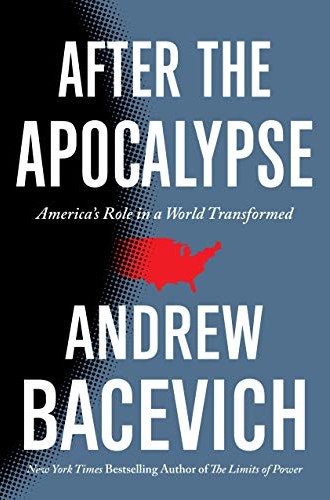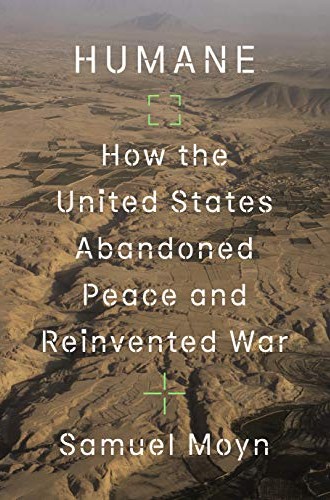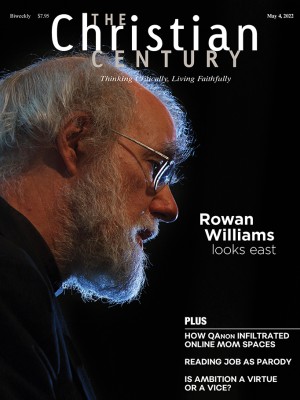The end of endless wars?
Andrew Bacevich and Samuel Moyn each seek a reckoning on how the United States uses its military abroad.
Until Russia’s invasion of Ukraine, the international positioning of the United States was for several decades defined by the war on terror. This framework led us to conduct simultaneous wars in Iraq and Afghanistan. It propelled us into dramatic new forms of drone warfare. In many ways, it continues to define our military’s efforts and military spending. And yet the need to rethink the nation’s military role in the world is urgent. The future that the war on terror projects for us involves trillions of dollars and millions of human lives wasted in the name of an imagined safety that is poorly defined and even more poorly created.
Two recent books attempt to build a vocabulary for a different way forward. Although they arise from different sets of concerns and ultimately propose different solutions to our dilemma, each is comprehensive in its own way—and each sees the need for a reckoning.
Read our latest issue or browse back issues.
Andrew Bacevich is a retired military officer and military historian who has positioned himself as a central critic of our current foreign policy and the use of our military internationally. His most recent book tries to “identify the connecting tissue between the delusions of the recent past and the traumas that are their progeny.” The delusions of the recent past are military delusions: that we can use our supreme military dominance to solve problems that are essentially political in nature. “The traumas that are their progeny” are a little more wide-ranging. Bacevich places both the war in Afghanistan and COVID-19 in that category.
It may seem strange to find a common root to these disparate events, but it makes sense once you realize that his essential argument has two components: one ideological and the other financial. What you spend money on tells you what you think the world is and what is of value. And in Bacevich’s opinion, the United States’ checkbook couldn’t be more poorly proportioned.
For example, if you think the world is full of dangerous enemies who are out to get you (as the war on terror instructed us to believe), then you’ve got to spend an enormous amount of money trying to figure out how to track these enemies down and kill them before they kill you. And this is exactly how the US military is arranged, with huge amounts of funding aimed at fighting these enemies on a global scale.
However, Bacevich argues, if you note that the greatest threats to our national security happen right here at home (including COVID-19 and climate change–related disasters), then you might allocate your spending differently. You might start to think that spending a little less on the latest and greatest drone technology designed to defeat foreign enemies and a little more on remaking the infrastructure of our own country so that we might create more safety in people’s daily lives is a good idea. Even a responsible, necessary idea.
But, Bacevich moans, we have learned nothing. A pandemic, a $1.6 trillion war with no discernible positive outcomes, and climate change disaster after climate change disaster have not caused us to pause in the war on terror or recalculate our role as the global police. All “the myriad disappointments and miscalculations of the post–Cold War decades have left the historical consciousness of 1947 remarkably intact,” he writes. We still think our wars are righteous and our tactics are the right ones. We still need to scan the world for the bad guys and blow them up, wherever they may be. Russia’s actions have perhaps exposed the haplessness of this way of thinking.
But Russia’s invasion of Ukraine has also been hard on some of the ideas that Bacevich pushes forward in this book. He would very much like to see us get rid of the idea of the West. It has done us no good, he says. The West does not really exist, and we need to part ways with the ideology it represents.
Second, we need to put the United States first. This is not the Trumpian “America first,” but it does say that we should start with securing our own well-being and then move outward, something Bacevich doesn’t think has happened since perhaps 2001. The war in Afghanistan cannot be said to have served the American people, he argues. So who did it serve?
Third, he believes that we need to withdraw all of our military bases around the world (except the ones in the Far East), let Russia have Ukraine, leave Israel to its own devices, withdraw from NATO, and spend a few decades using all the money we’ve saved on preventing climate change and ensuring the well-being of the people here at home. Since Russia’s invasion, Bacevich has come forward to argue that we are to blame for it, for “recklessly” expanding NATO when we should have been retracting it and reimagining it for a post–Cold War world.
There’s a lot to disagree with here, and in this mode, Bacevich’s argument lacks nuance. But on this point, I find him convincing: “A national security paradigm centered on military supremacy, global power projection, decades-old formal alliances, and wars that never seem to end [is] at best obsolete, if not itself a principal source of self-inflicted wounds.” This is the kind of “national security” Russia is currently enacting, and we know that it doesn’t work.
By the end of After the Apocalypse, you might find yourself thinking, “Why are we so stupid?” Law professor Samuel Moyn’s contribution to this conversation takes us quite a good distance beyond stupid toward an understanding of how we find ourselves in this situation.
Humane traces one through line in global history from the 19th century to the present day: the idea of world peace as it interacts with the idea of the humane war. In the 19th century, world peace—that nations might stop waging war entirely—seemed like a plausible political goal. But the idea that war could be made more humane, Moyn shows, is what captured our political and global imagination over the next century.
While 20th-century wars cannot be called humane by any means, the idea of humane war eventually created the conditions for what Bacevich calls, in After the Apocalypse, “wars that never seem to end.” With the United States spending more on its military than all of the world’s other large economies combined, America has been the primary creator of both the technology of humane war and the ideology of it. The imagined ideal is that the United States can use its military supremacy to control the world while reducing the human costs of war.
Sadly, this idea did not prove true as we watched Afghanistan crumble. And it has not found fertile new ground in Ukraine, as Russia has used decidedly inhumane tactics to conduct a costly and brutal ground war. But the idea and even passion for the humane war was on all of our minds as we wondered if the military could get the “good people” out of Afghanistan alive, save the starving children, and keep the Taliban in check. And it stays on our minds as we talk about Russia engaging in outdated techniques with an 18th-century mentality.
The humane war, Moyn argues, is not the same as the good war. The humane war is never interrogated for its greater purposes. Just war theory does not apply. Instead it is relentlessly criticized and investigated for its tactics. In the midst of a humane war, very few ever ask, “Why are we fighting in the first place? Should we even be here?” Instead they ask about targeted killings and civilian casualties.
In Moyn’s assessment, Barack Obama was this century’s greatest architect of the humane war. Obama created what Moyn calls a “drone empire” while working on a legal framework in international law that would allow the United States to go to war anytime with anyone anywhere in the world. Meanwhile he focused on correcting the errors of the Bush administration by expanding the humanity of the wars’ tactics: ever more precise weapons, an end to torture, and an “intense concern” for both the ethical and optical dimensions of making war humane. His administration created very high standards for the humane war and then tried to meet those standards, never mind that the very idea of perpetual war was in violation of decades of international law.
The war on terror, announced by the George W. Bush administration, was the vehicle that allowed the incredible expansion and duration of this global and never-ending war—because terrorists are always bad, and they can be anywhere, in any nation, ignored or supported by any government. The imagined result of fighting the war on terror is not an end to terror but a vast expansion of American power, while doubling down on the idea that Americans are always right wherever and whenever they choose to fight.
Moyn and Bacevich agree on this: wars fought like this can’t be won. The endlessness of the war in Afghanistan was not an accident. Our failure to secure a victory wasn’t due to carelessness or the failure of political will. It wasn’t the result of surging or failing to surge. It was the logical end of these new tactics and these new ideas about how war should be fought.
Unfortunately, with the new circumstances on the ground and the rapid shifting of global dynamics, the reckoning which both Moyn and Bacevich call for may be further off than ever. That doesn’t make it less necessary.








